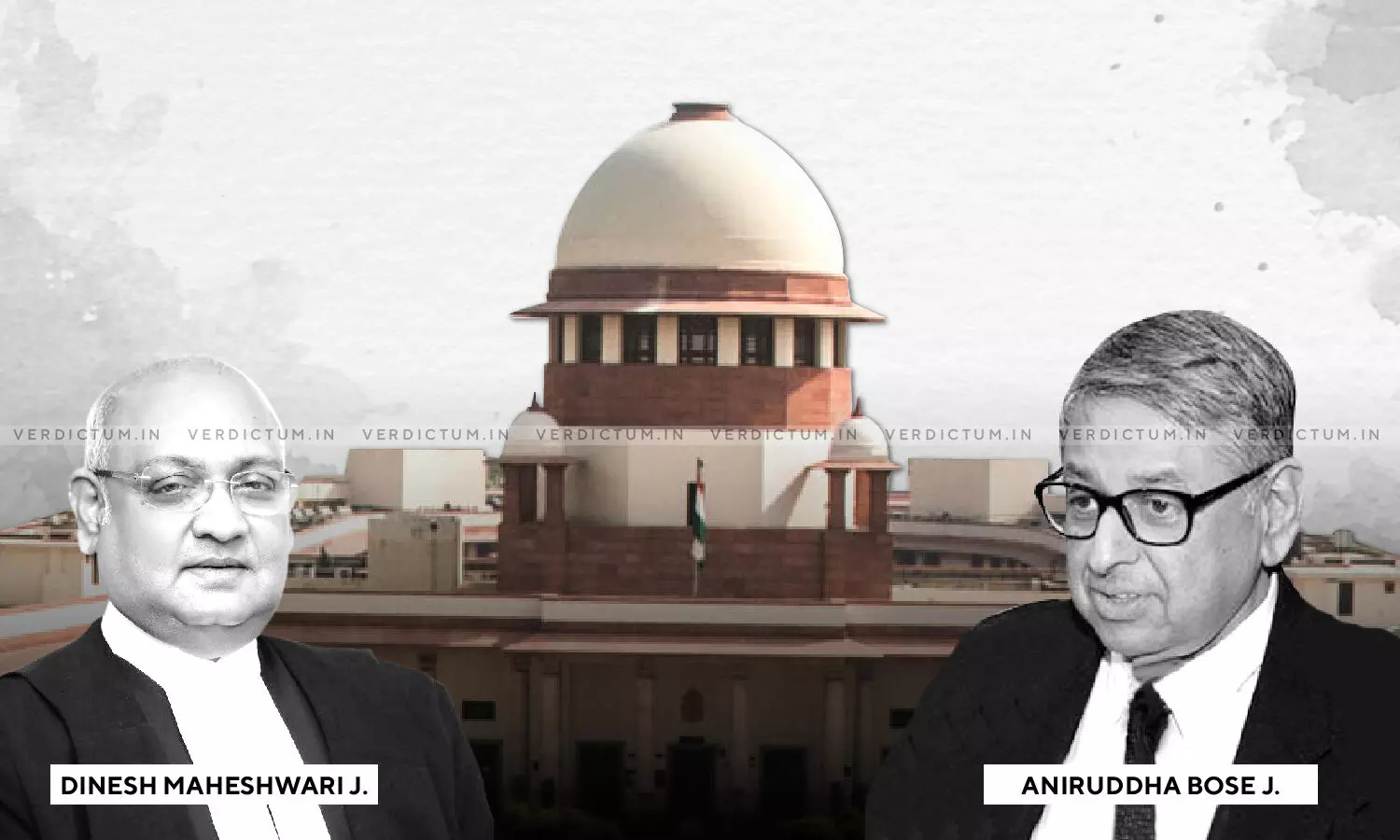
Period Spent In Promotional Post On Officiating Basis Cannot Be Included For Calculating Length Of Service In Particular Post- SC
 |
|The Supreme Court has observed that the period spent in a promotional post on officiating basis cannot be permitted to be factored in for calculating the length of service in a particular post.
The Bench of Justice Dinesh Maheshwari and Justice Aniruddha Bose held, "The period spent in a promotional post on officiating basis cannot be permitted to be factored in for calculating length of service in a particular post. Unless the Rules otherwise provide, officiation in a particular post cannot encadre the incumbent in that post."
In this case, the dispute was on the question of seniority of the appellants and Respondent no.4 (Keruupfeu– "K") in the cadre of senior lecturer under the State Council of Educational Research and Training Service (SCERT), Department of Education, Government of Nagaland. The appellants were collectively seeking seniority over Keruupfeu.
The point of taking off, so far as the proceedings giving rise to the instant appeal is concerned, is two Writ Petitions filed by Keruupfeu in the Gauhati High Court.
In these Writ Petitions, Keruupfeu had challenged the Departmental Promotion Committee proceedings and she also prayed for reconvening of DPC for the purpose of reconsidering the recommendation for regularisation of the four appellants in terms of the Nagaland State Council on Educational Training Service Rules, 2003.
Keruupfeu had also assailed the promotion of the four appellants in the posts of senior lecturer. Her main contention was that their adhoc period in the feeder cadre could not be counted for the purpose of eligibility for promotions.
Keruupfeu had asked for invalidation of the recommendation of the DPC in their meeting held on March 3, 2014. In this meeting, the DPC had reaffirmed their recommendation made on October 4, 2007 seeking to regularise the service of the appellants in the posts of senior lecturer from different dates prior to the date on which service of Keruupfeu was regularised in the same post. That was accepted by the State Government.
The High Court essentially remanded the matter to the DPC by setting aside their order holding that the DPC recommendation did not reflect consideration of the 2003 Rules.
Following the direction contained in the aforesaid judgment, a fresh DPC meeting was held. This meeting was held mainly to review the decisions of the DPC taken in their meetings, which were set aside by the High Court. But the DPC essentially retained their earlier decision concerning seniority list giving its own explanation of there being compliance of the 2003 Rules.
In the two writ petitions, Keruupfeu had sought to quash the fresh DPC recommendations coming from the meeting held on November 2, 2015. The earlier seniority position of Keruupfeu was retained by the DPC in their recommendation made in this meeting.
The Single Judge allowed the writ petitions against which the appellants appealed before the Division Bench. The Division Bench dismissed the appeals.
Aggrieved, appellants approached Supreme Court.
Senior Advocate V. Mohana appeared for the Appellants whereas Advocate K. Enatoli Sema represented Respondents.
The Court observed that the facts which emerge from the sets of events determining seniority positions of the appellants and Keruupfeu in the subject posts are that at the time of regularisation of Keruupfeu, the 2003 Rules was not in existence.
So far as the appellants are concerned, their regularisation in the posts in which they were officiating was effected on November 8, 2007. By that time the 2003 Rules had become operational.
The Court noted that once the said Rules became operational, the requirement of five-year service in the feeder grade also become applicable to be eligible for promotion in the next higher grade.
The Court observed that subject to any contrary provision, the time spent in the immediate superior grade on stopgap or adhoc basis ought not to be computed for determining the length of service of an incumbent in that cadre.
The Court noted that no such contrary provision was shown to it at the time of hearing of the appeal on behalf of the appellants or the State.
Therefore the Court held that the computation of the appellants' period of service in the feeder grade can take place only from the date of their regular appointment in that cadre.
The Court further noted that the appellants had entered the service as lecturer on contractual basis in the year 1992-93 around the same time Keruupfeu had joined as senior lecturer, also on contract basis.
The Court noted that to determine the length of service in the feeder posts as contained in Schedule II of the 2003 Rules, the time spent on contractual basis cannot be factored in.
The Court observed that "The appellants had no doubt completed three years of service in the feeder grade on operationalisation of 2003 Rules on 30th April 2007. But so far, the said Rules seek to give them regularisation in the cadre of senior lecturer with effect from 2003 and 2001 respectively, their service in the feeder grade do not meet the required stipulation of five-year period."
"We are testing here if the appellants' entry in the promotional cadre was as per the eligibility criteria or not. In our opinion, it was not. To hold otherwise would require entire stretch of K's service in the post of senior lecturer since 1993 to be taken into account for determining the interse seniority among the appellants and K.", the Court noted.
Therefore, the Court refused to interfere in the instant appeal and accordingly the appeal was dismissed.
Cause Title- Imlikokla Longchar & Ors v. The State of Nagaland & Ors.
Click here to read/download the Judgment